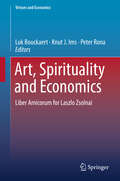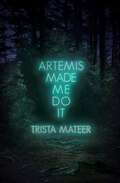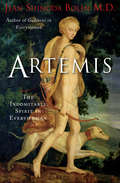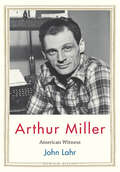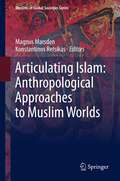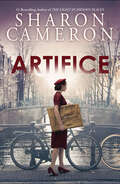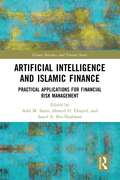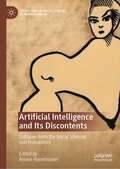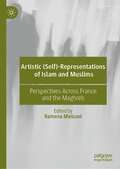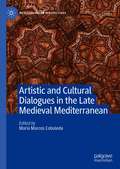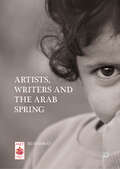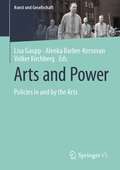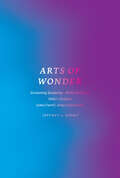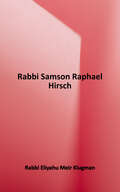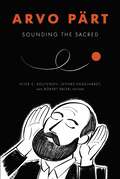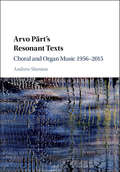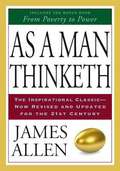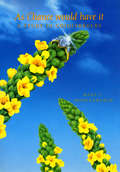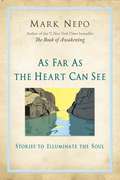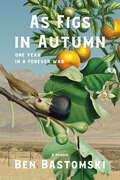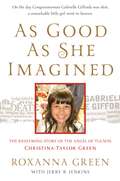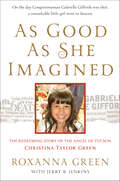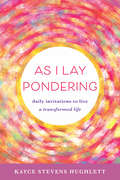- Table View
- List View
Art, Spirituality and Economics: Liber Amicorum for Laszlo Zsolnai (Virtues and Economics #2)
by Luk Bouckaert Peter Rona Knut J. ImsThis volume celebrates the work of Laszlo Zsolnai, a leading researcher and scholar in the field of the ethical and spiritual aspects of economic life, who has made significant contributions to the connection between ethics, spirituality, aesthetics and economic theory. <P><P>The book offers a selection of essays concerned with the ethical, spiritual and aesthetic context within which economics as a social studies discipline should be situated in order to avoid the sort of dehumanising consequences that theories based on utility maximisation and rational choice necessarily entail. It presents the economic activities of human beings not as some sort of preordained obedience to universal laws that operate independently of other human concerns, but, rather, as a part of the human desire for the Aristotelian good life. It looks at the various considerations –moral, spiritual and aesthetic – that take part in the formation of economic decisions in sharp contrast with theories that purport to explain economic phenomena solely on the basis of utility maximisation.
Artemis Made Me Do It (Myth and Magick #2)
by Trista MateerBestselling and award-winning author Trista Mateer returns with another magical approach to self-care in her newest goddess-themed poetry collection, Artemis Made Me Do It. Using the framework of tarot and conversation, Mateer approaches myth through a witchcraft-inspired lens and uses it to explore timeless issues like burnout, survival, trauma, and the restorative power in taking control of your own lore. Artemis speaks to what is wild and untamed in all of us, and in this new collection, she asks for a moment of calm. This is the second book in the Myth & Magick series, which also includes Aphrodite Made Me Do It and Persephone Made Me Do It.
Artemis: The Indomitable Spirit in Everywoman
by Jean Shinoda Bolen&“Jean Shinoda Bolen provides ancient and modern ways to be our authentic, courageous, and passionate selves. Jean herself is an Artemis.&”—Gloria Steinem Worshiped in Ancient Greece as a protectress of young girls, Artemis was the goddess of hunting, nature, and chastity—the original &“wild woman.&” In Artemis, Jungian analyst and bestselling author, Jean Shinoda Bolen, revives the goddess Artemis to reclaim the female passion and persistence to survive and succeed. But an indomitable spirit isn&’t just reserved for the gods. In her book, Dr. Bolen revives the myth of Atalanta, an archetypal Artemis and mere mortal. To Atalanta, fate was no obstacle. Left to die because she was born a girl, she faces the Calydon Boar and outruns any man attempting to claim her as his wife. In Artemis, women are encouraged to discover their inner heroine—the activist who never gives up, who cannot be subdued. Whether women&’s rights activists or Princess Merida from Brave, the Artemis personality is embodied in the modern women. Hailed by Isabel Allende, as a &“beautiful, inspiring book,&” Artemis is dedicated to all women and girls who discover her unconquerable spirit in themselves or others. Inside find: · Examples of Artemis in real-life and popular culture · Ancient and modern ways to be your authentic self · A source of strength, power, and integrity &“Bolen connects Artemis to contemporary figures such as environmental activist Julia Butterfly Hill, author Cheryl Strayed, and journalist Lara Logan . . . Bolen also discusses other goddess archetypes, including the romance-oriented Aphrodite, contemplative Hestia, and Hecate, the wise crone. The exploration of Artemis and Atalanta as feminist icons is compelling.&”—Publishers Weekly
Arthur E. Haas - The Hidden Pioneer of Quantum Mechanics: A Biography (Springer Biographies)
by Michael WiescherThe book highlights the personal and scientific struggles of Arthur Erich Haas (1884-1941), an Austrian Physicist from a wealthy Jewish middle-class family, whose remarkable accomplishments in a politically hostile but scientifically rewarding environment deserve greater recognition.Haas was a fellow student of both Lise Meitner and Erwin Schrödinger and was also one of the last doctoral students of Ludwig Boltzmann. Following Boltzmann's suicide, Haas was forced to submit a more independent doctoral thesis in which he postulated new approaches in early quantum theory, actually introducing the idea of the Bohr radius before Niels Bohr. It is the lost story of a trailblazer in the fields of quantum mechanics and cosmology, a herald of nuclear energy and applications of modern science. This biography of Haas is based on new and previously unpublished family records and archived material from the Vienna Academy of Science and the University of Notre Dame, which the author has collected over many years. From his analysis of the letters, documents, and photos that rested for nearly a century in family attics and academic archives, Michael Wiescher provides a unique and detailed insight into the life of a gifted Jewish physicist during the first half of the twentieth century. It also sheds light on the scientific developments and thinking of the time. It appeals not only to historians and physicists, but also general readers. All appreciate the record of Haas’ interactions with many of the key figures who helped to found modern physics.
Arthur Miller: American Witness (Jewish Lives)
by John LahrA great theater critic brings twentieth-century playwright Arthur Miller&’s dramatic story to life with bold and revealing new insights &“New Yorker critic Lahr shines in this searching account of the life of playwright Arthur Miller. . . . It&’s a great introduction to a giant of American letters.&”—Publishers Weekly Distinguished theater critic John Lahr brings unique perspective to the life of Arthur Miller (1915–2005), the playwright who almost single-handedly propelled twentieth-century American theater into a new level of cultural sophistication. Organized around the fault lines of Miller&’s life—his family, the Great Depression, the rise of fascism, Elia Kazan and the House Committee on Un-American Activities, Marilyn Monroe, Vietnam, and the rise and fall of Miller&’s role as a public intellectual—this book demonstrates the synergy between Arthur Miller&’s psychology and his plays. Concentrating largely on Miller&’s most prolific decades of the 1940s, 1950s, and 1960s, Lahr probes Miller&’s early playwriting failures; his work writing radio plays during World War II after being rejected for military service; his only novel, Focus; and his succession of award-winning and canonical plays that include All My Sons, Death of a Salesman, and The Crucible, providing an original interpretation of Miller&’s work and his personality.
Articulating Islam: Anthropological Approaches To Muslim Worlds (Muslims in Global Societies Series #6)
by Konstantinos Retsikas Magnus MarsdenThis collection of arresting and innovative chapters applies the techniques of anthropology in analyzing the role played by Islam in the social lives of the world's Muslims. The volume begins with an introduction that sets out a powerful case for a fresh approach to this kind of research, exhorting anthropologists to pause and reflect on when Islam is, and is not, a central feature of their informants' life-worlds and identities. The chapters that follow are written by scholars with long-term, specialist research experience in Muslim societies ranging from Kenya to Pakistan and from Yemen to China: thus they explore and compare Islam's social significance in a variety of settings that are not confined to the Middle East or South Asia alone. The authors assess how helpful current anthropological research is in shedding light on Islam's relationship to contemporary societies. Collectively, the contributors deploy both theoretical and ethnographic analysis of key developments in the anthropology of Islam over the last 30 years, even as they extrapolate their findings to address wider debates over the anthropology of world religions more generally. Crucially, they also tackle the thorny question of how, in the current political context, anthropologists might continue conducting sensitive and nuanced work with Muslim communities. Finally, an afterword by a scholar of Christianity explores the conceptual parallels between the book's key themes and the anthropology of world religions in a broader context. This volume has key contemporary relevance: for example, its conclusions on the fluidity of people's relations with Islam will provide an important counterpoint to many commonly held assumptions about the incontestability of Islam in the public sphere.
Artifice
by Sharon CameronA dramatic story of duplicity and resistance, betrayal and loyalty, set against the backdrop of World War II, by the #1 New York Times bestselling author of The Light in Hidden Places.Isa de Smit was raised in the vibrant, glittering world of her parents’ small art gallery in Amsterdam, a hub of beauty, creativity, and expression, until the Nazi occupation wiped the color from her city’s palette. The “degenerate” art of the Gallery de Smit is confiscated, the artists in hiding or deported, her best friend, Truus, fled to join the shadowy Dutch resistance. And masterpiece by masterpiece, the Nazis are buying and stealing her country’s heritage, feeding the Third Reich’s ravenous appetite for culture and art.So when the unpaid taxes threaten her beloved but empty gallery, Isa decides to make the Nazis pay. She sells them a fake—a Rembrandt copy drawn by her talented father—a sale that sets Isa perilously close to the second most hated class of people in Amsterdam: the collaborators. Isa sells her beautiful forgery to none other than Hitler himself, and on the way to the auction, discovers that Truus is part of a resistance ring to smuggle Jewish babies out of Amsterdam.But Truus cannot save more children without money. A lot of money. And Isa thinks she knows how to get it. One more forgery, a copy of an exquisite Vermeer, and the Nazis will pay for the rescue of the very children they are trying annihilate. To make the sale, though, Isa will need to learn the art of a master forger, before the children can be deported, and before she can be outed as a collaborator. And she finds an unlikely source to help her do it: the young Nazi soldier, a blackmailer and thief of Dutch art, who now says he wants to desert the German army.Yet, worth is not always seen from the surface, and a fake can be difficult to spot. Both in art, and in people. Based on the true stories of Han Van Meegeren, a master art forger who sold fakes to Hermann Goering, and Johann van Hulst, credited with saving 600 Jewish children from death in Amsterdam, Sharon Cameron weaves a gorgeously evocative thriller, simmering with twists, that looks for the forgotten color of beauty, even in an ugly world.Praise for Artifice“War, resistance, and art are Cameron’s canvas; her palette is a balance of trust and perfidy, beauty and defiance, new life and old. Artifice is a vibrantly-hued and many-layered story, exploring our very human inability to spot a fake when we long to believe that the object of all our desire is the real thing.” -- Elizabeth Wein, New York Times bestselling author of Code Name Verity* "Painterly prose...filled with rich intrigue depicts constantly shifting issues of trust in this complex, absorbing tale." -- Publishers Weekly, starred review
Artificial Intelligence and Islamic Finance: Practical Applications for Financial Risk Management (Islamic Business and Finance Series)
by Adel M. SareaThis book provides a systematic overview of the current trends in research relating to the use of artificial intelligence in Islamic financial institutions (IFIs), across all organization of Islamic cooperation (OIC) countries. Artificial Intelligence and Islamic Finance discusses current and potential applications of artificial intelligence (AI) for risk management in Islamic finance. It covers various techniques of risk management, encompassing asset and liability management risk, credit, market, operational, liquidity risk, as well as regulatory and Shariah risk compliance within the financial industry. The authors highlight AI’s ability to combat financial crime such as monitoring trader recklessness, anti-fraud and anti-money laundering, and assert that the capacity of machine learning (ML) to examine large amounts of data allows for greater granular and profound analyses across a variety of Islamic financial products and services. The book concludes with practical limitations around data management policies, transparency, and lack of necessary skill sets within financial institutions. By adopting new methodological approaches steeped in an Islamic economic framework (e.g., analysing FinTech in the context of Shariah principles and Islamic values), it devises practical solutions and generates insightful knowledge, helping readers to understand and explore the role of technological enablers in the Islamic finance industry, such as RegTech and artificial intelligence, in providing better and Shariah-compliant services to customers through digital platforms. The book will attract a wide readership spanning Shariah scholars, academicians, and researchers as well as Islamic financial practitioners and policymakers.
Artificial Intelligence and Its Discontents: Critiques from the Social Sciences and Humanities (Social and Cultural Studies of Robots and AI)
by Ariane HanemaayerOn what basis can we challenge Artificial Intelligence (AI) - its infusion, investment, and implementation across the globe? This book answers this question by drawing on a range of critical approaches from the social sciences and humanities, including posthumanism, ethics and human values, surveillance studies, Black feminism, and other strategies for social and political resistance. The authors analyse timely topics, including bias and language processing, responsibility and machine learning, COVID-19 and AI in health technologies, bio-AI and nanotechnology, digital ethics, AI and the gig economy, representations of AI in literature and culture, and many more. This book is for those who are currently working in the field of AI critique and disruption as well as in AI development and programming. It is also for those who want to learn more about how to doubt, question, challenge, reject, reform and otherwise reprise AI as it been practiced and promoted.
Artistic (Self)-Representations of Islam and Muslims: Perspectives Across France and the Maghreb
by Ramona MieluselArtistic (Self)-Representations of Islam and Muslims: Perspectives Across France and the Maghreb is a collection of essays that explores the question of artistic representation(s)/self-representation(s) of Muslim religious and cultural identity in France, the Maghreb and in/between since the 2000s. The volume offers a plurality of feminine and masculine voices and points of view on cultural Islam (Franco-French, Franco-Maghrebi, Maghrebi), all the while addressing the impact of events like 9/11, the tragic attacks in France in 2015-2016 (Charlie Hebdo, Stade de France, Bataclan, Nice), and the Arab Spring. Taken together, the volume features a transnational and transversal set of artistic voices that are not looking for consensus, but rather invoke dissensus (Rancière) and a full range of expression. A necessary part of that full range of expression is (self)-representations: Muslims representing themselves, though this is no facile (self)-representations, as artists continue to use the properties of the imagination and performance to complexify an easy reading, reductive meaning, or oversimplified interpretation. This interdisciplinary study contributes to the fields of French and Francophone Studies, Humanities and Global/Cultural Studies such as political studies, sociology, political philosophy, literature, cinema, visual arts and media studies with a focus on broadening views on the topic of Islam and Muslim (self)-representations across disciplines.
Artistic and Cultural Dialogues in the Late Medieval Mediterranean (Mediterranean Perspectives)
by María Marcos CobaledaThis book analyses the artistic and cultural legacy of Western Islamic societies and their interactions with Islamic, Christian and Jewish societies in the framework of the late medieval Mediterranean, from a range of multi-disciplinary perspectives. The book, organised in four parts, addresses the Andalusi legacy from its presence in the East and the West; analyses the relations and transfers between Al-Andalus and the artistic productions of the Christian kingdoms of the Iberian Peninsula; explores other manifestations of the Andalusi legacy in the fields of knowledge, construction, identity and religious studies; and reconsiders ornamental transfers and exchanges in artistic manifestations between East and West across the Mediterranean basin.Chapter 2 is open access under a CC BY 4.0 license.
Artists, Writers and The Arab Spring (Middle East Today)
by Riad IsmatThe book aims to explore the foresight of prominent Middle Eastern authors and artists who anticipated the Arab Spring, which resulted in demands for change in the repressive and corrupted regimes. Eventually, it led to cracking down on the protests with excessive force, which caused tremendous human suffering, destruction, and also escalation of extreme insurgency. The author analyzes major literary and artistic works from Egypt, Syria and Tunisia, and their political context. This monograph will be helpful to scholars and students in the growing field of Middle Eastern and North African Studies and everyone who is interested in the politics of MENA.
Arts and Power: Policies in and by the Arts (Kunst und Gesellschaft)
by Volker Kirchberg Lisa Gaupp Alenka Barber-KersovanThe focus on concepts of power and domination in societal structures has characterized sociology since its beginnings. Max Weber’s definition of power as “imposing one’s will on others” is still relevant to explaining processes in the arts, whether their production, imagination, communication, distribution, critique or consumption. Domination in the arts is exercised by internal and external rulers through institutionalized social structures and through beliefs about their legitimacy, achieved by defining and shaping art tastes.The complexity of how the arts relate to power arises from the complexity of the policies of artistic production, distribution and consumption—policies which serve to facilitate or hinder an aesthetic object from reaching its intended public. Curators, critics and collectors employ a variety of forms of cultural and artistic communication to mirror and shape the dominant social, economic and political conditions.Arts and Power: Policies in and by the Arts brings together diverse voices who position the societal functions of art in fields of domination and power, of structure and agency—whether they are used to impose hegemonic, totalitarian or unjust goals or to pursue social purposes fostering equal rights and grassroots democracy. The contributions in this volume are exploratory steps towards what we believe can be a more systematic, empirically and theoretically founded sociological debate on the arts and power. And they are an invitation to take further steps.
Arts of Wonder: Enchanting Secularity—Walter De Maria, Diller + Scofidio, James Turrell, Andy Goldsworthy (Religion And Postmodernism Ser.)
by Jeffrey L. Kosky“The fate of our times is characterized by rationalization and intellectualization and, above all, by ‘the disenchantment of the world.’” Max Weber’s statement remains a dominant interpretation of the modern condition: the increasing capabilities of knowledge and science have banished mysteries, leaving a world that can be mastered technically and intellectually. And though this idea seems empowering, many people have become disenchanted with modern disenchantment. Using intimate encounters with works of art to explore disenchantment and the possibilities of re-enchantment, Arts of Wonder addresses questions about the nature of humanity, the world, and God in the wake of Weber’s diagnosis of modernity. Jeffrey L. Kosky focuses on a handful of artists—Walter De Maria, Diller + Scofidio, James Turrell, and Andy Goldsworthy—to show how they introduce spaces hospitable to mystery and wonder, redemption and revelation, and transcendence and creation. What might be thought of as religious longings, he argues, are crucial aspects of enchanting secularity when developed through encounters with these works of art. Developing a model of religion that might be significant to secular culture, Kosky shows how this model can be employed to deepen interpretation of the art we usually view as representing secular modernity. A thoughtful dialogue between philosophy and art, Arts of Wonder will catch the eye of readers of art and religion, philosophy of religion, and art criticism.
Artscroll: Rabbi Samson Raphael Hirsch
by Rabbi Eliyahu Meir KlugmanThe inspiring life story of Rabbi Samson Raphael Hirsch.
Arvo Pärt: Sounding the Sacred
by Peter C. Bouteneff, Jeffers Engelhardt, and Robert SalerScholarly writing on the music of Arvo Pärt is situated primarily in the fields of musicology, cultural and media studies, and, more recently, in terms of theology/spirituality. Arvo Pärt: Sounding the Sacred focuses on the representational dimensions of Pärt’s music (including the trope of silence), writing and listening past the fact that its storied effects and affects are carried first and foremost as vibrations through air, impressing themselves on the human body. In response, this ambitiously interdisciplinary volume asks: What of sound and materiality as embodiments of the sacred, as historically specific artifacts, and as elements of creation deeply linked to the human sensorium in Pärt studies? In taking up these questions, the book “de-Platonizes” Pärt studies by demystifying the notion of a single “Pärt sound.” It offers innovative, critical analyses of the historical contexts of Pärt’s experimentation, medievalism, and diverse creative work; it re-sounds the acoustic, theological, and representational grounds of silence in Pärt’s music; it listens with critical openness to the intersections of theology, sacred texts, and spirituality in Pärt’s music; and it positions sensing, performing bodies at the center of musical experience. Building on the conventional score-, biography-, and media-based approaches, this volume reframes Pärt studies around the materiality of sound, its sacredness, and its embodied resonances within secular spaces.
Arvo Pärt’s Resonant Texts: Choral and Organ Music 1956–2015
by Andrew ShentonStatistically the most performed and listened to contemporary composer in the world, Arvo Pärt is a musical and cultural phenomenon. This book is an essential resource for anyone interested in his extraordinarily innovative and uniquely appealing music. <P><P>Andrew Shenton surveys the full scope of Pärt's oeuvre, providing context and chronological continuity while concentrating in particular on his text-based music, analysing and describing individual pieces and techniques such as tintinnabulation. The book also explores the spiritual and theological contexts of Part's creativity, and the challenges of performing his work. This volume is the definitive guide for readers looking to engage with the form, content, and context of Pärt's compositions, as Shenton situates Pärt in the narrative of metamodernism and suggests new ways of understanding this unique and beautiful music.<P> This is the only book to explore the entire career of this extremely popular contemporary composer.<P> Includes numerous musical examples, enabling readers to understand the form, content, and context of individual pieces, as well as key innovative techniques such as tintinnabulation.<P> Suggests broader approaches to Christian texts, making Pärt's work accessible to a wider audience.<P>
As A Man Thinketh
by James AllenThe mind guides our footsteps as we progress along the pathway of life.<P> Purity of mind leads inevitably to purity of life, to the precious love and understanding that should control our everyday acts and attitudes towards friends and foes.<P> But where must one look for guidance? How does one achieve purity of mind that alone brings happiness and confidence?<P> The author offers his clear answers in this book As A Man Thinketh. His words have helped millions for more than a century--and they continue to point the true way to a better life for a troubled humanity.<P> "Out of a clean heart comes a clean life and a clean body," James Allen writes. "out of a defiled mind proceeds a defiled life and a corrupt body."<P> Too many mortals strive to improve only their wordly position--and too few seek spiritual betterment. Such is the problem James Allen faced in his own time. The ideas he found in his inner-most heart after great searching guided him as they will guide you.
As Chance Would Have It: A Study in Coincidences
by H C MoolenburghCoincidences happen to everyone on a regular basis. Usually we shrug them off and forget them.However, when we start to catalogue coincidences we are in for a surprise. They begin to grow more frequent and, moreover, they tend to form a pattern as if conveying a secret message.
As Far As the Heart Can See: Stories to Illuminate the Soul
by Mark NepoStories carry the seeds of our humanness. They help us, teach us, heal us, and connect us to what matters. As Far As the Heart Can See is an invitation to be in relationship with deep and life-giving material. Many spiritual gurus present dense metaphysical theses with an intellectual approach for "working" a spiritual path; poet and philosopher Mark Nepo reaches people through their hearts, bringing something fresh and new to the field by stimulating change through reflection of thoughts and feelings. The stories he shares in As Far As the Heart Can See come from many places—from Nepo's personal history to dreams to the myths of our ancestors. Each one is an invitation to awaken an aspect of living in relationship with the sacred. Following each of the forty-five stories are three forms of an invitation to further the conversation: journal questions, table questions, and meditations. The questions, whether reflected upon in a journal or discussed in deeper conversation with friends or family, are meant to lead the seeker down unimagined paths and back into life; the meditations are meant to ground the learning. These stories and parables about universal concepts and themes offer a poet's sensuality and a philosopher's sensibility to personalizing the journey of the human experience in the world.
As Figs in Autumn: One Year In A Forever War
by Ben BastomskiA devastating loss turns into a quest for identity in this debut memoir of an American coming of age in the Israel Defense Forces. On the verge of graduating from college, Ben Bastomski is sent reeling by the tragic death of his childhood friend and classmate Avi, the victim of a drunk driving accident. The shocking event forces Ben to question everything about the randomness and meaning of life for the first time. In the fall of 2010, Ben begins his journey from student to sharpshooter when he flies to the Middle East and joins the Mahal, the Israel Defense Forces&’ program for overseas Jewish volunteers. As his service takes him from the Negev Desert to the Occupied Territories and the Gazan border, he makes his home on a southern kibbutz where he is accepted as family. Ben&’s military service and life in Israel will shape his future in ways that are still being realized. As Figs in Autumn is one man&’s account of a life-changing quest to find his true potential in the land of his heritage, where both body and soul are sustained by courage and community.
As Full as the World: Reading 6 (2nd Edition)
by Bob Jones UniversityThis book engages students with a variety of character-building stories as well as classical literature selections from which biblical principles are drawn. An emphasis on literary elements, higher-level thinking skills, and vocabulary enrichment is a bridge to the traditional literature classes that begin in junior high. The student text includes samples from classic authors, Charles Dickens, Kenneth Grahame, Emily Dickinson, and Robert Browning.
As Good as She Imagined: The Redeeming Story of the Angel of Tucson, Christina-Taylor Green
by Jerry B. Jenkins Roxanna GreenBy the time the shooting ended on that cloudless January day in front of a Tucson grocery store, 19 innocent people lay wounded, dead, or dying. Among the gravely wounded was U. S. Congresswoman Gabrielle Giffords.
As Good as She Imagined: The Redeeming Story of the Angel of Tucson, Christina-Taylor Green
by Roxanna Green Jerry JenkinsChristina-Taylor Green was beautiful, precocious and popular, a member of her elementary school's student council and the only girl on her Little League team. Born on 9/11/2001, it was perhaps no surprise that she harbored aspirations of becoming a politician-thus her presence at the political rally that fateful day in Tucson last January. Congressman Gabrielle Giffords was severely wounded in the gunman's splay of bullets; six others were killed, including Christina, the youngest of the victims.But this inspirational book recounts far more than the events of "the tragedy of Tucson." Written by Christina's mother (with New York Times best-selling biographer Jerry Jenkins), As Good As She Imagined celebrates this little girl's life, along with the hope that has been born out of a nation's loss and a family's grief.
As I Lay Pondering: daily invitations to live a transformed life
by Kayce Stevens HughlettPsychotherapist, healer, and artist of being alive, Kayce Stevens Hughlett, offers readers the personal gift of transformation in this devotional daybook. Like Mark Neop's classic "Book of Awakening," Hughlett invites individuals to enliven their lives day-by-day through 365 practical reflections and prayers of inspiration, purpose, freedom, and joy.Infused with teachings from historical and current wisdom figures like Carl Jung, Martha Beck, Buddha, Jesus, Lao Tzu, Thomas Merton, Sue Monk Kidd, Anne Lamott, and others, "As I Lay Pondersing" feels like sitting down for conversation with a close friend. Filled with soul, it will meet you where you are whether looking for a recharge or grasping for a lifeline. It is a book you can turn to anytime and read cover to cover, randomly, or one entry at a time. Filled with inspiration, short stories, and simple activities to deepen the pathway to presence, this book is the ideal companion for any personal journey.
